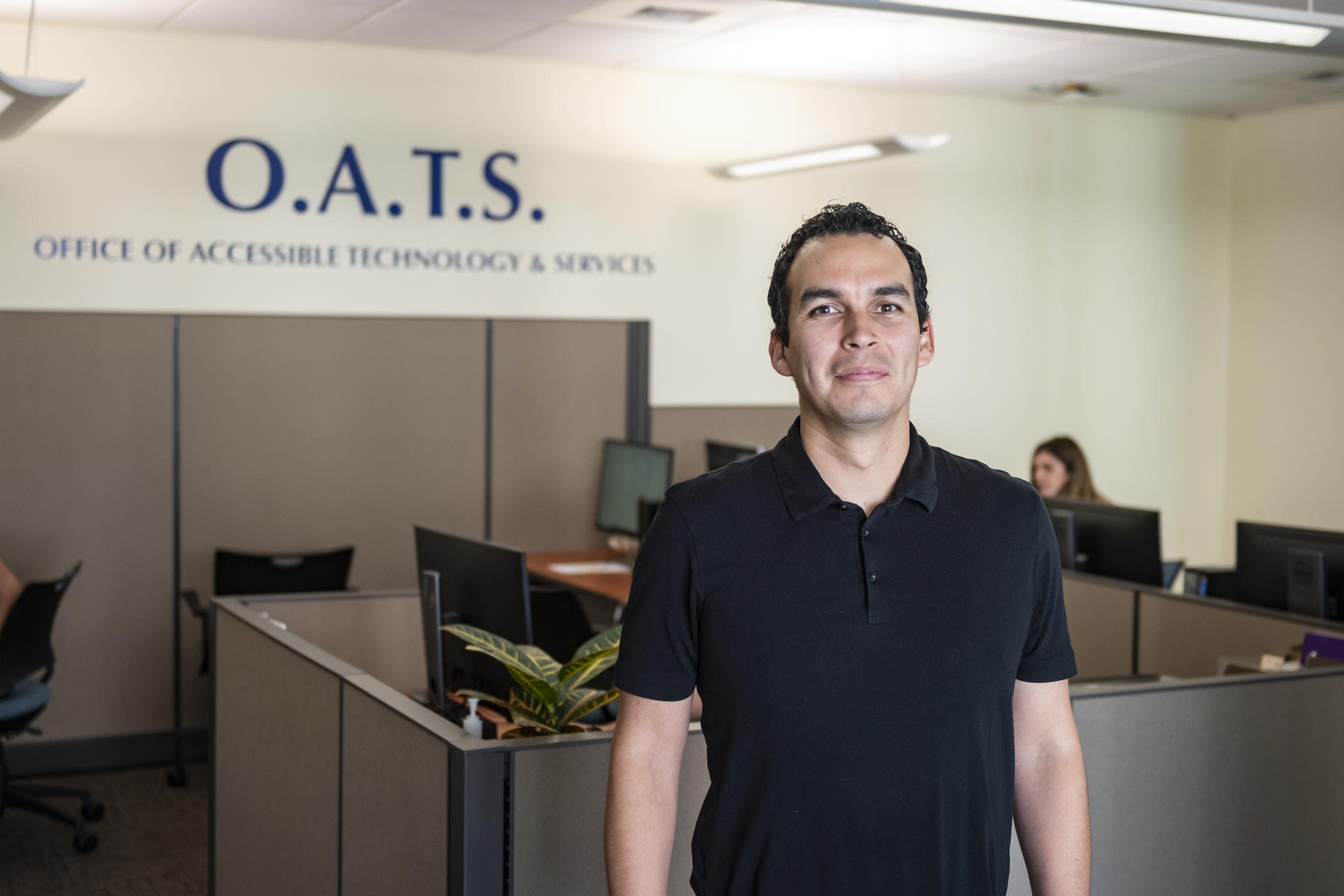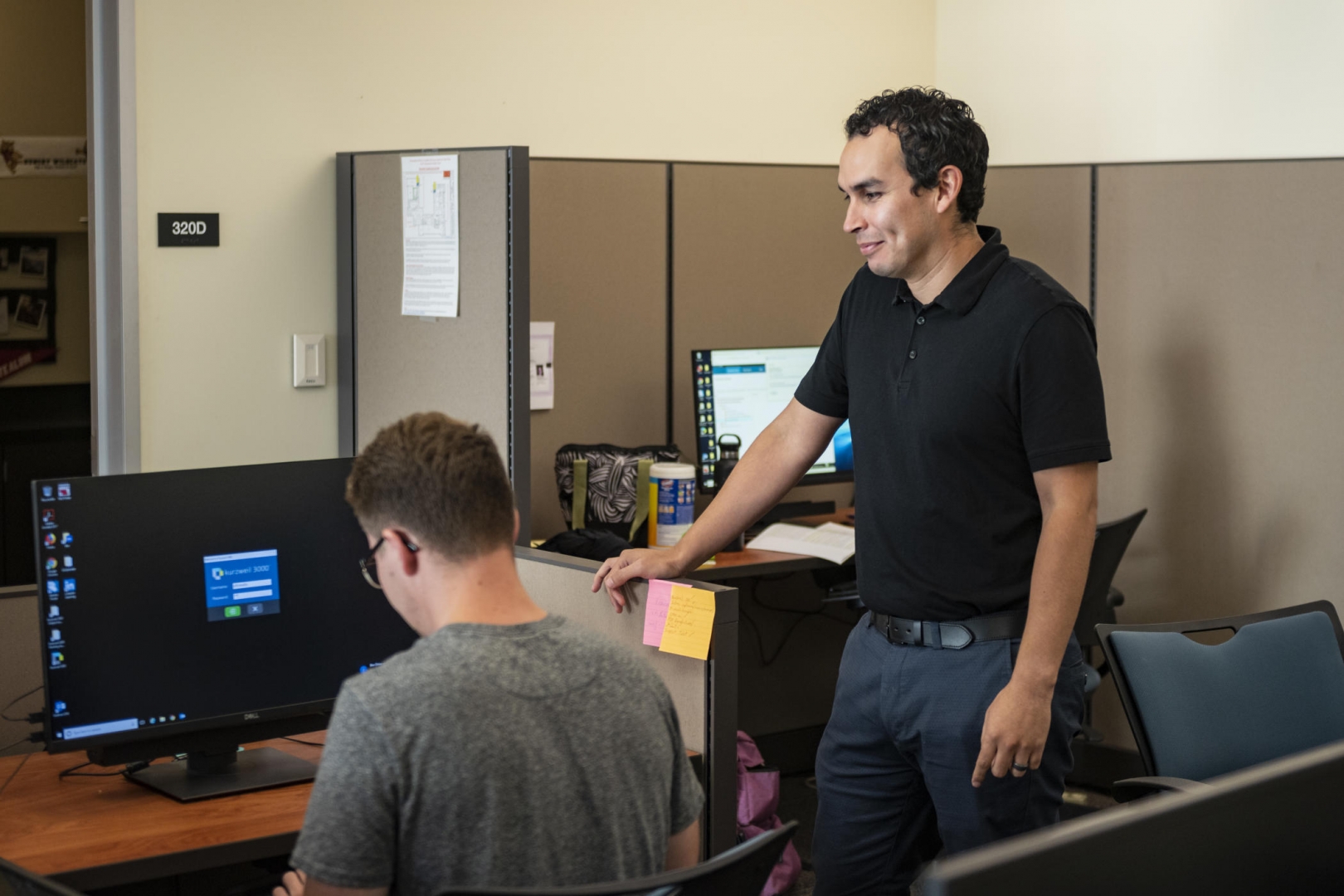Putting a Priority on Accessible Technology

Jeremy Olguin, Accessible Technology Manager is working in the Office of Accessible Technology and Services, to change accessibility to inclusive access for all students on Tuesday, September 3, 2019 in Chico, Calif. (Jason Halley/University Photographer/CSU Chico)
Story by journalism major Heather Oest
Jeremy Olguin has worked in accessibility since he was 18 years old. As an undergraduate majoring in world mythology and culture at CSU Monterey Bay, he discovered that when it came to technology, the school had few resources for students with disabilities.
His second semester there, he began working 32 hours a week in the Student Disability Resource Center and remained there until graduation, when he was hired to work in accessible technology at Bellevue College in Seattle.
“From my first job, I’ve always said accessibility is just a gateway to getting people to realize it’s inclusive technology,” he said. “We have to make these available to everyone on campus.”
As he saw his efforts result in increases in graduation rates, a sense of making a difference pushed Olguin to continue in this career path. After working for 4 1/2 years at Cal State East Bay, he was hired at Chico State in 2011 to work in the Accessibility Resource Center.
It wasn’t long before those efforts branched off to create the Office of Accessible Technology and Services (OATS), which today employs 17 student assistants and one other staffer in addition to Olguin as its program coordinator.
“We ended up seeing a need for larger depth on campus when it came to inclusivity and equitable technology practices, so then we kind of started helping faculty and helping staff outside of the disability arena, which then got us into working with diversity, got us working into universal design, kind of took us into all the different directions that we weren’t planning on,” Olguin said.
Today, OATS works with staff, faculty, students, administrators, and community members to ensure that state and federal accessibility standards are met in all aspects of the University.
The office provides captioning of University videos, alternative media, and content literacy tools. Olguin is especially excited about a partnership with the School of Education, through which OATS will release a universal access toolkit in April. This kit, available to all Chico State students and employees, will create easy, one-stop access to such technologies and services.
The kit will be launched as part of an extended Tipping Point event that will showcase all the accessible technology resources, how they work, and how they can be helpful. It even includes an accessible walking map for campus.
“We constantly hear about tools people are using technology-wise on campus, and you hear about them two years after you needed them,” Olguin said. “To group all that together in one place is something we’ve needed for a long time.”

He also hopes the toolkit will bring in more faculty and staff partners to share what they have been doing to meet their own needs and those of students, while also benefitting themselves by the available services.
“A lot of people could be helped who aren’t,” he said. “We could reach a lot of students who don’t necessarily qualify for accommodation, and a lot of faculty who don’t even realize there are tools out there to help them. We want to put them into the forefront and really create this environment of inclusion that we are talking about.”
At first, only students with disabilities sought out what OATS has to offer. Now, however, students from all backgrounds are starting to seek help, as well as faculty and staff. In addition to meeting accessibility needs, the office team also assists with general technology, such as Blackboard. More graduate students are now utilizing the services, too.
Olguin believes the students who benefit most from OATS are the ones who don’t have or don’t feel that they need access to the services that the office provides. Students not affiliated with certain groups, such as the Educational Opportunity Program or Accessibility Resource Center, soon learn the tools are available to use at their own leisure and benefit their education.
Unfortunately, not many students know that OATS exists, Olguin said. In hopes of finding a way to better reach students, the office is looking to build a partnership with Associated Students marketing.
With his commitments to increasing accessibility and awareness as strong today as ever before, Olguin brings trust into his work relationships and takes pride in having that integrity and dedication.
“It’s the whole ‘be impeccable with your word.’ It really is. You know when it comes to doing this kind of work, it’s not always going to go smoothly, it’s not always going to be great,” Olguin said. “You’re going to make mistakes, but make sure you learn from those and provide the best service possible.”
Meanwhile, the office continues to bring in accolades and attract national attention for its successes. In the last 18 months, OATS has been profiled eight times by various publications and groups, and Olguin said the office gets calls daily from others who want to model what Chico State is doing.
OATS is open 8 a.m. to 5 p.m., Monday–Friday in Student Services Center, Room 320.
Heather Oest is a senior majoring in journalism. She is a writer for Tehama Group Communications, a student-operated public relations center in the Department of Journalism and Public Relations. This story was produced for and originally published by the Office of Equity, Diversity, and Inclusion for its fall Building Bridges newsletter.


